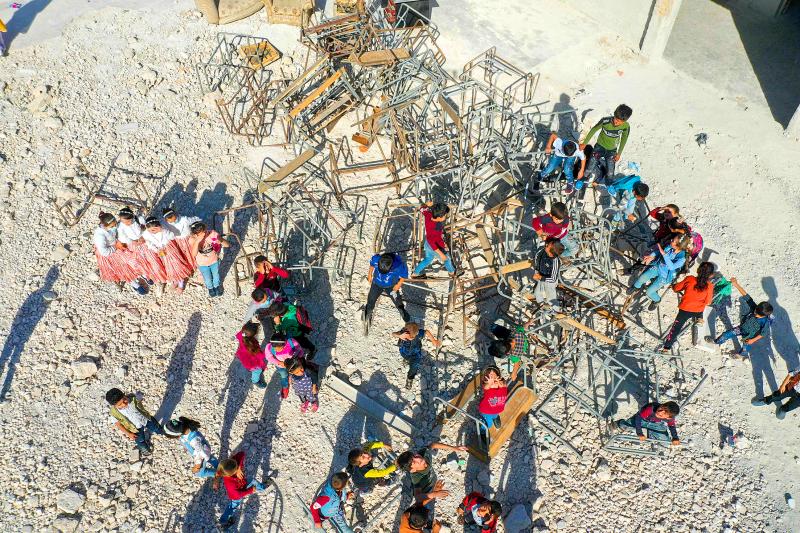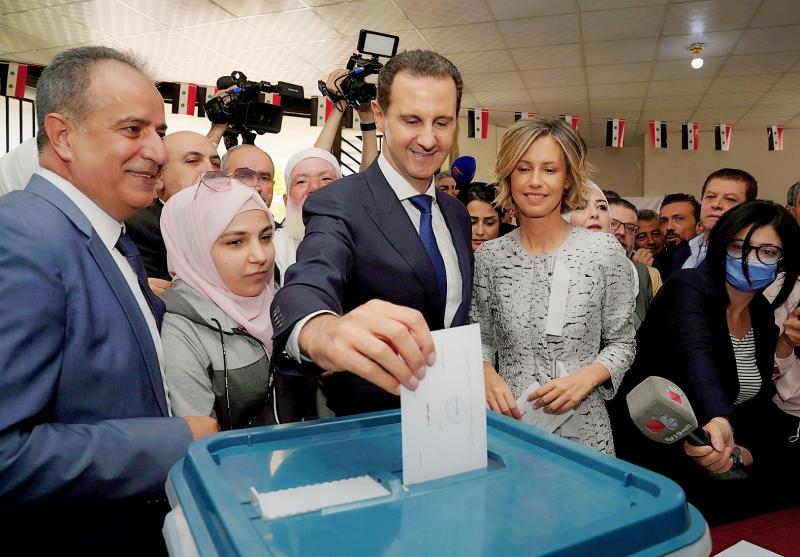While Syrian President Bashar al-Assad is still shunned by the West, who blame him for a decade of brutal war in Syria, a shift is under way in the Middle East, where Arab allies of the US are bringing him in from the cold by reviving economic and diplomatic ties.
The extension of al-Assad’s two-decade-old presidency in an election in May did little to break his pariah status among Western states, but fellow Arab leaders are coming to terms with the fact that he retains a solid grip on power.
The US’ chaotic withdrawal from Afghanistan has firmed up a belief among Arab leaders that they need to chart their own course.

Photo: AFP
Anticipating a more hands-off approach from Washington — which is preoccupied by the challenge of China — Arab leaders are driven by their own priorities, notably how to rehabilitate economies hammered by years of conflict and COVID-19.
Political considerations also loom large in Arab capitals such as Cairo, Amman and Abu Dhabi. These include their ties with al-Assad’s most powerful backer, Russia, which has been pressing for Syria’s reintegration, and how to counter the influence carved out in Syria by Iran and Turkey.
While the signs of Arab rapprochement with Damascus are growing — King Abdullah of Jordan spoke to al-Assad for the first time in a decade this month — US policy remains a complicating factor.

Photo: Reuters
Washington says that there has been no change in its policy toward Syria, which demands a political transition as set out in a UN Security Council resolution.
US sanctions targeting Damascus — which were tightened under former US president Donald Trump — still pose a serious obstacle to commerce.
However, in Washington, analysts say that Syria has hardly been a foreign policy priority for US President Joe Biden’s administration.
They say that Biden’s focus has been on countering China and that his administration has yet to apply sanctions under the so-called “Caesar Act,” which came into force last year with the intent of adding to the pressure on al-Assad.
After being warned against dealing with Damascus by the Trump administration, Arab states are pressing the issue again.
“US allies in the Arab world have been encouraging Washington to lift the siege on Damascus and allow for its reintegration into the Arab fold,” said David Lesch, a Syria expert at Trinity University in Texas. “It appears the Biden administration, to some degree, is listening.”
It marks a shift from the early years of the conflict when Syria was expelled from the Arab League and states including Saudi Arabia, Jordan and the United Arab Emirates, backed some of the rebels that fought al-Assad.
Jordan, Syria’s neighbor to the south, has been leading the pack on the Arab policy shift with an ailing economy and a rocky patch in relations with its wealthy Gulf neighbor Saudi Arabia.
The border between Syria and Jordan was fully reopened for trade last month, and Amman has been a driving force behind a deal to pipe Egyptian natural gas to Lebanon via Syria, with an apparent US nod of approval.
The crossing was once plied by hundreds of trucks a day moving goods between Europe, Turkey and the Gulf. Reviving trade will be a shot in the arm for Jordan and Syria, whose economy is in deep crisis. It should also help Lebanon, now suffering one of the sharpest economic depressions in modern history.
“I’m absolutely sure the Jordanians feel that the US will not sanction them,” said Jim Jeffrey, a former US special envoy for Syria under Trump.
“There’s a tremendous buzz among media, among friends in the region, that the US is no longer aggressively sanctioning al-Assad under the Caesar Act or other things.”

Indonesia yesterday began enforcing its newly ratified penal code, replacing a Dutch-era criminal law that had governed the country for more than 80 years and marking a major shift in its legal landscape. Since proclaiming independence in 1945, the Southeast Asian country had continued to operate under a colonial framework widely criticized as outdated and misaligned with Indonesia’s social values. Efforts to revise the code stalled for decades as lawmakers debated how to balance human rights, religious norms and local traditions in the world’s most populous Muslim-majority nation. The 345-page Indonesian Penal Code, known as the KUHP, was passed in 2022. It

‘DISRESPECTFUL’: Katie Miller, the wife of Trump’s most influential adviser, drew ire by posting an image of Greenland in the colors of the US flag, captioning it ‘SOON’ US President Donald Trump on Sunday doubled down on his claim that Greenland should become part of the US, despite calls by the Danish prime minister to stop “threatening” the territory. Washington’s military intervention in Venezuela has reignited fears for Greenland, which Trump has repeatedly said he wants to annex, given its strategic location in the arctic. While aboard Air Force One en route to Washington, Trump reiterated the goal. “We need Greenland from the standpoint of national security, and Denmark is not going to be able to do it,” he said in response to a reporter’s question. “We’ll worry about Greenland in

PERILOUS JOURNEY: Over just a matter of days last month, about 1,600 Afghans who were at risk of perishing due to the cold weather were rescued in the mountains Habibullah set off from his home in western Afghanistan determined to find work in Iran, only for the 15-year-old to freeze to death while walking across the mountainous frontier. “He was forced to go, to bring food for the family,” his mother, Mah Jan, said at her mud home in Ghunjan village. “We have no food to eat, we have no clothes to wear. The house in which I live has no electricity, no water. I have no proper window, nothing to burn for heating,” she added, clutching a photograph of her son. Habibullah was one of at least 18 migrants who died

Russia early yesterday bombarded Ukraine, killing two people in the Kyiv region, authorities said on the eve of a diplomatic summit in France. A nationwide siren was issued just after midnight, while Ukraine’s military said air defenses were operating in several places. In the capital, a private medical facility caught fire as a result of the Russian strikes, killing one person and wounding three others, the State Emergency Service of Kyiv said. It released images of rescuers removing people on stretchers from a gutted building. Another pre-dawn attack on the neighboring city of Fastiv killed one man in his 70s, Kyiv Governor Mykola